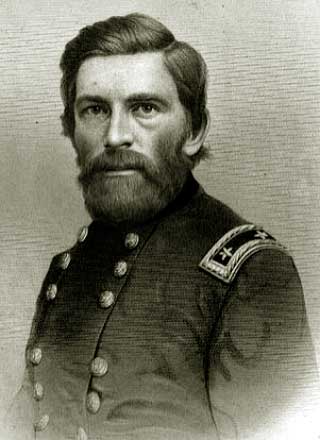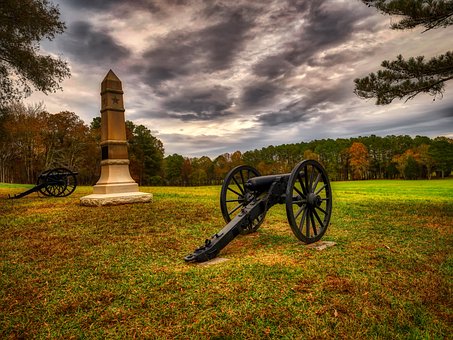
Civil War Spymaster Extraordinaire
I’m always intrigued by spy stories, especially tales of intrigue from the Civil War. Much has been written about Pinkerton’s legions, Belle Boyd, Rose O’Neil Greenhow, Sarah Emma Edmonds, and others. I’d never even heard of Major General Grenville Dodge. According to the Office of the Department of National Intelligence, Dodge became the “most effective spymaster in the Western Theatre [of the Civil War], and perhaps of the whole war.”
Dodge was a man of many talents. He graduated with a degree in civil engineering in 1851, worked in surveying and planning railroads, and settled in Council Bluffs, Iowa as a businessman and community leader in the 1850s.
However, when the Civil War broke out, he answered the call to defend his nation. Eager for a field command, he accepted a colonelship and outfitted a regiment. He was admired and acclaimed for his bravery, determination, and strategy in the Battle of Pea Ridge in Arkansas (where he had three horses shot from underneath him) in 1862 and Atlanta in 1864, but Generals Grant and Sherman recognized that his true talents lay elsewhere.
Dodge was a master railroad builder and destroyer. His arch-enemy in the task of maintaining open railways for the transportation of Union troops and supplies in the Western Theater was Brig. General Nathan Bedford Forest. It was said that Dodge could repair railroads faster than Forrest could destroy them.
However, the underlying secret to Dodge’s greatest success was his spy network. He had his men in the right place and at the right time at Pea Ridge because his spies had discovered that the Confederates had split their forces, and the spies determined from which direction the “surprise” attack would happen. His agents, along with his expert engineering skills and blockade-house strategies, helped him to stay ahead of Nathan Bedford Forest, as well.
Early in the war, Dodge grew weary of having his cavalry missions thwarted by inaccurate intelligence. He determined to rectify the matter by hiring a company of scouts to risk their necks for a price to keep him apprised of enemy activity.
From this small outfit, his spy network grew to over one hundred operatives, including former slaves and Union sympathizers behind Confederate lines. He enlisted women in his rank of spies, as well, and they proved their worth as effective assets.
Dodge carried on his operation while rising in rank to Major General and leading the 2nd Division of the Army of the Tennessee. Only his commanding officers and his adjutants and provost marshals were even aware that he was in the spy game.
The intelligence gathered by his agents significantly assisted Grant in his victory at Vicksburg. One of Dodge’s operatives managed to get inside Vicksburg and garnered a pass from the Confederate commander that granted him/her free access to the garrison’s defensive positions. With this key information on artillery and troop numbers and positions, Grant was able to concentrate his men where they could do the most damage to the enemy.
In addition, when Jefferson Davis ordered General Joseph Johnston to march to Vicksburg with reinforcements, Dodge’s operatives infiltrated Johnston’s ranks and discovered that the Confederates were only sending half of the number of men that had been reported. This bit of news enabled Grant to leave thousands more of his men at Vicksburg instead of sending the main body to intercept the approaching Confederates.
Dodge cared about the safety and lives of his operatives. He trained them well, and he refused to tell his commanding officers and others the identities of his spies. Only he knew who they were. In fact, he worked to keep their names off the army payroll. With permission from Grant, Dodge paid his men and women with funds raised from selling confiscated Confederate cotton. In addition, he avoided meeting with them face to face, keeping the veil of secrecy by exchanging information indirectly. He also told them if they were ever caught to be forthcoming and not try to pass themselves off as civilians, that it’d be better to reveal information and to be executed.
The spymaster was also adept at counterespionage. In late 1863, Dodge and his agents foiled a highly effective Confederate spy ring, known as Colman’s Scouts, who had successfully been gathering information on Federal troop strength and movements and interrupting communications in Tennessee. The enemy ring consisted of forty-five secret service men and a talented leader who at times disguised himself as a babbling, elderly herbal doctor.
In April 1861, when Dodge accepted an officer’s commission in the Federal Army, he wrote to his mother: “I go into this war on principle, [which] pecuniarily [financially] will ruin me. I put my trust in God; if I come out safe, I hope no one will have cause to regret my course.” Dodge devoted himself to protecting his people and preserving the Union, pouring every ounce of courage, determination, and intelligence he possessed into the cause.
Sources:
Harbor, Susan. “Harber’s History Lesson: Spymaster Henry Shaw Was Leader of Coleman’s Scouts.” The Daily News Journal. Rutherford Historical Society. 5 May 2017
“Grenville Dodge: The Fighting Spymaster.” Office of the Director of National Intelligence. Intel.gov. https://www.intelligence.gov/evolution-of-espionage/civil-war/union-espionage/grenville-dodge
Wilmot, Julie. “The Civil War’s Most Interesting General.” History.net. 29 Nov. 22. https://shop.historynet.com/blogs/new-the-latest-from-historynet-com/the-civil-war-s-most-interesting-general


10 thoughts on “Spymaster Extraordinaire”
Wow, loved this story, Sherry!! What a courage, wise man Dodge was!!! I pray we use the wisdom and talent the Lord has given us this effectively!!! Thank you for this inspiring post!! 🙂
Yes, in the Battle of Pea Ridge, he had three horses killed under him and a fourth wounded, but he kept fighting. Even his enemies admired his courage. And before the Battle of Atlanta, he built a bridge in two days because that’s what the Union Army needed.
Great insight, Erma. This story isn’t just about Dodge. We can apply it to our lives. I,too, pray that we can use the wisdom and talent the Lord has given us effectively and to His glory! Thank you!
I’ve heard of Grenville Dodge but had no idea he’d been a spy. Thank you for this interesting and very informative post!
I think he’s better known as one of the men who helped make the transcontinental railroad happen. He advocated for it, and then helped build it. But I love the spy part of his life story best:)
GREAT HISTORY LESSON OF THE CIVIL WAR. LOVED IT.
Thank you! I enjoyed the research. His courage and determination are admirable.
I do love a good spy story. Thanks for sharing!
I love a bit of intrigue:) Thank you for stopping by!
Oh, I love spy stories too.:) thank you, Sherry.
Yes, the research on Dodge has made me interested in researching other 18th & 19th century spies:)
Comments are closed.